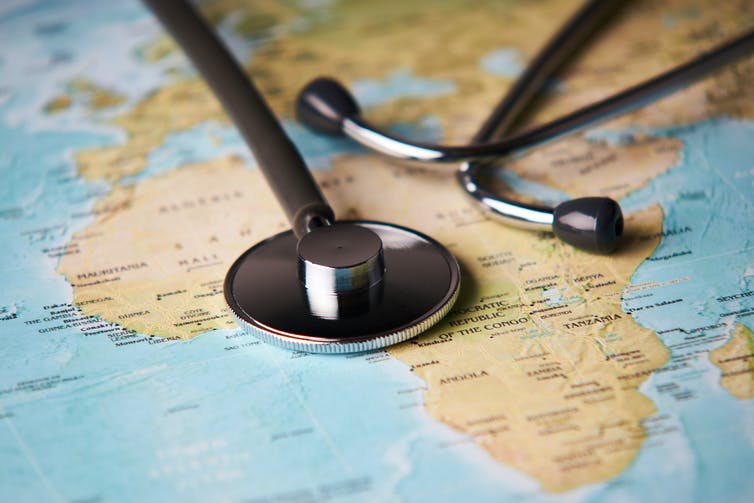Years from now, students of law, and perhaps history, will look back at this year and document it as a turning point in the medico-legal profession. They will sit behind their computer screens (if that is what is still obtainable then) and read up on how a court in England convicted a senior Nigerian politician of human trafficking for the purpose of organ harvesting. The verdict is said to be a first of its kind under the Modern Slavery Act.
It is no more news that after a six-week trial at the Old Bailey, former Deputy Senate President, Ike Ekweremadu; his wife Beatrice and their doctor have been convicted of ‘intent to commit human trafficking’.
The doctor was identified as Obinna Obeta and is said to be residing in Southwark in south London. He was charged under the Modern Slavery Act with arranging the travel of the 21-year-old man with a view to him being exploited between August and May. In another charge, the fifty one year old doctor was alleged to have conspired with the couple to arrange or facilitate the travel of the man with a view to him being exploited for organ harvesting.
And while the indictment was primarily focused on Senator Ekweremadu, I was more interested in the case of the said doctor. Over the course of more than 20 years, Dr. Obinna Obeta has had a renowned medical career and was also a prosperous business. eHealth4everyone and Pinnacle Medical Services are two of the healthcare firms he founded and serves as CEO of. These businesses are concentrated on utilizing technology to enhance healthcare access and delivery in Africa. In 2018, he was recognised as one of Africa Youth Awards’ 100 Most Influential Young Africans. The Nigerian daily ‘The Guardian’ called him one of the 50 Most Influential Nigerians in Technology.
- Cameroon, Niger, Benin citizens lament fuel subsidy removal in Nigeria
- Mixed reactions over proposed merger of FIRS, Customs, NIMASA
A few days ago, while in clinic, I saw a young woman who came complaining of symptoms of upper respiratory infection. While her symptoms were unremarkable, what caught my attention was her gynae and obstetric history. The young woman who was in her early twenties, with no children alive, said she had two surgeries for ectopic pregnancy. The surgeries were both carried out in a private facility, and she was told the surgeries were both carried out on the same side- her left tube. I was confused.
Two ectopic pregnancies and subsequent surgeries on the same side?
The doctor had told her not to worry about her subsequent fertility and because of that the poor woman was on contraceptives. She wanted a break after suffering two ectopic pregnancies. As she did not seem to know the details of her surgery and was ignorant about what an ectopic pregnancy meant, I asked her to do a pelvic ultrasound.
Lo and behold! Both her tubes had been removed. A salphingectomy had been carried out, twice. And yet this woman was under the illusion that she could still get pregnant.
I wanted to weep in outrage. Why was she not told? Why feed her lies?
Everyday, we see and hear cases of fraudulent medical practices. From the popular ‘open and close’ (the act of telling a patient he or she requires ‘urgent’ surgery, making them pay huge amount of money, giving them general anaesthesia, and then incising the abdomen only to close it back immediately, with NOTHING being done and then telling the patient that the surgery was successful) to the less common ‘washing of blood’. The first time I heard of the act of ‘washing blood’ for patients with ‘chronic malaria and typhoid’, I nearly wept. You mean people would come with symptoms and a doctor would go ahead and exploit them by telling them he would wash their blood? Simply set up an Intravenous fluid stand and give the patient rifampicin to give the illusion that the patient was urinating blood?
So apart from selling babies at hospitals, harvesting eggs for IVF, illegal abortions, selling narcotics, illegal prescriptions, pharmaceutical fraud, overbilling patients, and insurance companies, selling blood and blood products and many other crimes too horrific to mention, we have now added modern slavery to the mix.
I take no joy in castigating people of my profession. It is with the utmost reluctance that I admit that some most of these crimes are masterminded by doctors who possess the medical knowledge on how to perpetuate them. If a person can be brilliant enough to alter the biochemical composition of a patient’s blood to reflect a certain result to suit his personal judgment, then why can he not use that brilliance to find a cure for cancer? Or find a cure for the barrage of diseases that plague us?
Why would someone risk a professional career that took years of tears and sweat to build, stoop so low as to become a middleman scouting for people from whom to harvest their kidneys? Because of four million naira? How much is N4m to medical doctor? Las las, if you hustle seriously for a month or two, going to several hospitals to provide services as my colleagues are known to do, you will get that money. And this is in Nigeria, for someone who was living and supposedly practicing in the UK, he would have realised that amount of money from Locum practices in a few weeks.
So, what exactly is the problem?
Is it greed? Is it the economic crisis we find ourselves in? Is it a flagrant disregard for the law? Is it our overdependent relatives (black tax)? Or is it our god complex?
What is it?
How can a person who swears to safeguard human life suddenly start scamming patients up and down? When did we become so fraudulent?
Several of the world’s medical fraud experts, including Dr David Evans, director of the Department of Health Systems Financing at the World Health Organization (WHO), are of the opinion that not only is the extent of health care fraud vastly underestimated around the world, but it’s also probably going to get worse because of the global financial crisis. “It seems that during periods of economic downturn the cost of fraud frequently increases”.
With many countries facing times of austerity, tackling health fraud is becoming a necessity and the first step in doing so is to admit that we have a problem. This case of Dr Obinna and the Ekweremadu’s should be a catalyst for investigating other fraudulent practices.
And while evidence points to the contrary, I refuse to believe that it was poverty that pushed the doctor to engage in this criminal activity. I feel it was more of ‘I can get away with anything as a doctor’ attitude.
There is a quote by the famous physician, Sir Robert Hutchinson, that I have pinned up in my office board. On good days, it affirms my state of mind and on bad days, it motivates.
‘Those of you, on the other hand, who have put examinations behind you will be thinking in terms of professional success and naturally look farther ahead. Let me advise you not to aim too high. The big prizes in our profession are only for the few, and they do not always bring much happiness when gained. “Seekest thou great things? Seek them not” as the wise man said. If you have earned enough for your needs and been able to put a little aside for your old age, and if, at the same time, you have won the esteem of your colleagues and the affection of your patients, you have done well enough, and that measure of success should be within the reach of most of you.’
[First published on May 13, 2023]

 Join Daily Trust WhatsApp Community For Quick Access To News and Happenings Around You.
Join Daily Trust WhatsApp Community For Quick Access To News and Happenings Around You.